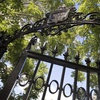A solemn black man walked to the microphone and jolted hundreds of tired "peace movement" people with the news: "Soledad Brother" George Jackson was killed tonight in San Quentin Prison. Brother Jackson lay dead. Frantic "oh no"'s shot through the conference room. The audience was asked to stand in silent memory of the dead man's life. The room suffered in silence. The man then suggested the "Clergy and Laymen Concerned" could best honor Jackson by continuing with the Saturday night agenda--the establishment of national priorities for the coming year. The men and women participants in the final plenary session of the national conference resumed the evening's business.
A few minutes later, Phil Lawson, the man who had announced Jackson's death, returned to the floor with a resolution that would wrench the assembly.
After explaining the circumstances of the death, which he called "murder," Lawson proclaimed, "George Jackson was killed because he was black. He lives because he was a revolutionary." He then asked "Clergy and Laymen Concerned" to endorse his resolution.
Some of the underlying philosophical differences which had simmered through most of the week-long gathering were about to be translated into intolerant invective. For five days now, the 450 conference participants brought together in Ann Arbor, Michigan, had sought comprehensive strategies to make their religion a part of the solution to social and political injustices, both national and international. From the beginning of the conference, the diversity had been manifest with differing philosophies, analyses and strategies. The differences had grown with the organization, which was started six years before to protest the escalation in Vietnam. The leadership--concerned that the war was not over but sharing the feeling that its end was linked to the end of other government abuses--was now anxious to broaden its concerns to domestic shortcomings, and to develop a more systematic critique of American foreign policy. They found themselves caught in the middle, between those who felt that ending the war should retain the highest priority and those who felt, in fact, that an end to the war would make it even more difficult to solve other social problems, if the campaigns were unlinked.
The differences among the conference participants would have to be understood before they could be reconciled, but the death of George Jackson exaggerated these misunderstandings rather than harmonizing them.
Controversy over the Jackson resolution was bitter. A young Quaker named Ross Flanagan announced that he, as a non-violent person, could not support the statement. His was a difficult announcement to make, and his voice shook. These reservations provoked countering statements of support for the resolution with varying degrees of outrage and bitterness. The chairman asked Phil Lawson to go with several others to prepare a resolution which might be generally acceptable, and to then deliver it to the assembly. In the confusion in the back of the room, Phil, seething, told supporters, "I don't intend to bring it back to have it ratified." Chris, a young instructor at Penn who had spoken heatedly in favor of the resolution, tried to soothe Lawson by saying that Ross didn't have much power. Phil left the room with several friends.
A lull followed as the conference waited for the revised resolution on George Jackson. Suddenly a frail woman rushed the mike and branded the discussion of the Jackson statement "tasteless and obscene." "A man has been killed," she screamed. "Do we think that our sentiments are so goddamned important?" Staggering in shock, the clergy and laymen retreated into sorrowful prayer. One of the few blacks in the room--a woman--began softly: "We Shall Overcome."
The resolution--now called a "memorial statement"--finally returned with virtually no change. The group accepted it. Professors and plumbers, pacifists and militants, revolutionaries and Republicans--they all respected the memory of George Jackson this Saturday night, the last night of the six-day session.
As the plenary ended, the national co-director of "Clergy and Laymen Concerned" chatted with another man--the one person who had offered muffled reservation on the second Jackson statement. Dick Fernandez, whose energetic activities throughout the week had been consistent with the four months of leadership and intensive planning that led up to the conference, seemed surprised and disappointed: "They just affirmed that black guys have the right to shoot their way out of prison...I don't think they believe that."
The wrenching contradictions had been there from the first day. Tuesday, August 17. Driving to Ann Arbor through the dull flatlands of Michigan, we felt distant from any problems: the driver cruising at 85, the recurring billboard--"Farmer Pete's People Pleasin' Meats", the popular song on the radio, George Harrison's "Bengla Desh," ("So many people are dyin' fast....") The mood at the University of Michigan campus in Ann Arbor was serious. Jock Brown's "guerrilla liturgy" the first evening set the tone of searching for an awareness of each individual's complicity in the war. Jock, a minister from the Berkeley Free Church, described coming back from downtown Dayton the evening of the destruction of Hiroshima: "I don't know whether our hands were covered with blood, but our faces were covered with lipstick."
There was no doubt that commitment was here in Ann Arbor. Clergy and laymen were concerned, but the problem was where that concern should be channelled. They were trying to change directions, but they didn't know how, or how far.
Muhammad Kenyatta, of the Black Economic Development Conference, was one of those pushing hardest for a strong re-ordering of priorities. Addressing the assembly Wednesday night, he lambasted the liberal establishment in a heated, rambling polemic, scorning targets from the late Robert Kennedy ("slick-ass") to the conference itself ($55 registration keeps the poor out). The message was simple, and it was repeated: the people with the cash had better "cut loose" their "ill-gotten gains." He was enthusiastic as he ended, bringing half of the middle-class crowd to their feet in applause. A welfare mother from Maine, Carolyn Dow, in an unscheduled speech, knocked herself as "white trash" and then ripped into conference leaders for their middle-class orientation. Her melodramatic conclusion--"I hoped things had changed"--received a good response.
Friction surfaced at the Friday night plenary. A woman, frustrated by the slowness of progress and her fear that little would come of the week's work, spewed forth her unhappiness: "Are you going to be a national organization? Are we going to have principles?" Other criticisms followed, some of them maligning the national leadership. After listening for about ten minutes, co-director Fernandez responded in kind: "The distrust in this room is just incredible....Do you think this is some game we've been playing for the last four months?" "No, for the last four days," a black woman answered.
The underlying conflict and factionalism was a constant, though predictable, threat to the conference, predictable because of the highly diverse character of the constituency. A typical conflict came in a morning discussion group, in an exchange between Chris, the Penn instructor, and Arthur, an affable middle-aged man with a round face and Marty Allen hairdo. Arthur suggested that the differences among the group were small compared with "common priorities" they shared: "I still think that, out of our common background, the religious community, our number one priority should be 'Stop the Killing,'" Chris, a slight young man with long hair and glasses, dismissed this as "off-the-wall," contending that they must understand their differences and be "up front" about them. He favored a "radical analysis," emphasizing the interrelation of all the inequities inherent in American capitalism.
Sometimes the contradictions at the conference were utterly blatant. The large sessions took place in Dow Auditorium, Right. Dow.
Read more in News
Text of Letter from the AAAAS












